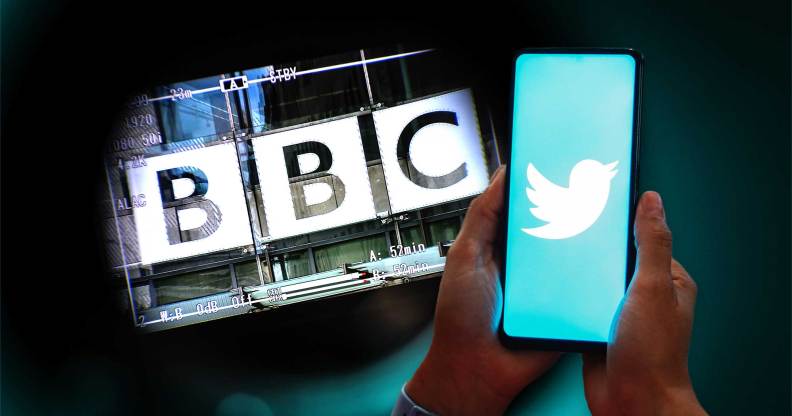Social media users could be sued for speculating on BBC presenter scandal, lawyer warns

Twitter has been consumed by speculation over the BBC presenter scandal. (Getty)
A top defamation lawyer has warned social media users who gossip about the BBC presenter scandal could be sued and face financial ruin.
The BBC has been under intense scrutiny since The Sun published allegations that one of its presenters had paid a young person £35,000 over a three-year period for nude images.
The newspaper published an interview with the mother of the person involved in the claims, who is now 20, on Friday (7 July). The BBC confirmed it had suspended a male presenter on Sunday (9 July).
On Monday (10 July), BBC News reported that the young person had, through a lawyer, denounced their mother’s accusations as “rubbish”, insisting that nothing inappropriate or unlawful had taken place. On Tuesday, a second young person came forward with more allegations.
Neither The Sun nor the BBC has named the presenter at the centre of the story – but that hasn’t stopped speculation online.
Several well-known presenters, including Rylan Clark, Gary Lineker and Jeremy Vine, have come out to distance themselves from the story following false claims.
Repeating allegations could land people in legal trouble
Solicitor Max Campbell, who specialises in media and communications law at the London-based firm Brett Wilson, told PinkNews that there is a significant legal risk to individuals who share claims on social media.
“Anyone repeating the allegations made against the unknown BBC presenter on social media, could, in theory, be sued for defamation, either by the actual presenter in question, who may assert that the allegations are false, or – in the event that they wrongly identify someone else – by that party,” Campbell, a partner at the firm, explained.
A defamatory statement is one that harms the reputation of a person, company or organisation.
Defamation comprises the legal wrongs of libel and slander. Libel relates to a defamatory statement in writing or other permanent form, such as in a broadcast. Slander is verbal, made by word of mouth.
Whether or not the BBC presenter has been named, repeating allegations could still result in a defamation case.
‘Do not engage in public discussion about this at all’
Campbell added: “Significantly, the mere fact that a person is not named… does not preclude a claim for defamation.”
He explained that the question would be whether a “reasonable” person would understand the statement to refer to the person bringing the case.
“People might also be liable for endorsing (or being seen to endorse) publications by others (for example, re-tweeting),” he continued. “The only sensible advice for people generally would be not to engage in public discussion about this at all.”
‘Most serious cases can result in six-figure awards’
Because false allegations can cause “devastating reputational harm as well as immense distress”, the repercussions can be huge.
“The damages (compensation) awarded to a successful claimant in a libel claim will vary, based predominantly on the gravity of the allegations, and the scale of the publication,” Campbell continued.
“Each case turns on its own facts. The most serious cases can result in six-figure awards. However, the legal costs associated with a libel claim (on both sides) can prove financially ruinous even if a claim is resolved at an early stage [and/or] for a relatively modest sum.”
Already, Nicky Campbell has suggested he is willing to take legal action over false allegations.
On his Monday morning BBC Radio 5 Live show, he said: “It was a distressing weekend – I can’t deny it – for me and others falsely named. Today, I’m having further conversations with the police in terms of malicious communications and with lawyers in terms of defamation.”
Campbell added on Twitter: “I think it’s important to take a stand. There [are] just too many of these people on social media. Thanks for your support, friends.”
On Tuesday (11 July), a second young person came forward with allegations against the BBC presenter. They told BBC News they had connected with the presenter on a dating app, and had received abusive messages from him after hinting they would identify him online.
Earlier that day, the Metropolitan Police asked the BBC to pause its investigation into the suspended presenter while it assesses whether there is scope for a criminal investigation.
The young person referenced in The Sun’s story insists no crime was committed. Their lawyer said: “For the avoidance of doubt, nothing inappropriate or unlawful has taken place between our client and the BBC personality and the allegations reported in The Sun newspaper are rubbish.”
There has been speculation over whether the presenter could be named in the House of Commons under parliamentary privilege which allows freedom of speech whereby MPs can’t be prosecuted for anything said in the chamber, Westminster Hall or a parliamentary committee.
The protection extends to written and oral questions, motions, early day motions, and amendments tabled to bills and motions. Such statements could then be broadcast or printed through qualified privilege, as long as it is done so without malice.
Two Cabinet ministers have said they would not use this option to name the presenter.

